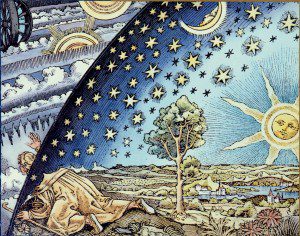Western humanism comes to us from Europe, and really begins in the Renaissance, although it rises by looking to classical antiquity, particularly Greece. This Renaissance humanism combined a celebration of the individual with a close observation of the world around us. And it turns out that is amazingly powerful. This humanism, in fact, shattered the world that had been before.
Instead of our world being the center of the cosmos, we found the Earth is a small rocky planet, spinning around a middling sized star, somewhere out at the very edge of one of many, many, many galaxies, all them part of an inconceivably large universe. And, possibly even more startling, was that whatever was supposed to be meant by humans being created in the image of the divine, we humans have been irrefutably shown to be one of several species of great ape, fully a part of the biological world. So, in humanism, humans are very important, but always within the context of being a very small part of something very big, and very complicated.
As we all know those various discoveries about us and the natural world, would come in fits and starts over many years. And, and, this is important, all along the way people in power have resisted it, challenging, marginalizing, mocking, imprisoning and killing humanists for defying the old ways in their, if you will in our relentless quest to know what is. But, at least so far, this humanist current has been unstoppable.
In time the Renaissance humanist enterprise became the European Enlightenment, and out of that modern scientific method and various philosophies of the person not based in revelation emerged. Today physics is revealing the astonishing weirdness of the very small and the very large in ways that challenge our understanding of the material world. But I believe its biology that has caused the greatest stir to date. In particular Darwin’s and Wallace’s twin discovery of a mechanism for biological change through natural selection has shattered the old certainties about God, and with that loosening the iron grip of organized religions.
In the spiritual realm the discovery of natural selection, to my heart at least, and I know for many others, put the last nail in the coffin of the last great argument for the existence of a supreme God, the so-called “argument from design.” It means, whatever else may be true, the world does not need a conscious agent in order to come to this world that we exist within. Rather what we find is pattern, ordering, is a natural thing that needs no supernatural interference to happen. Rather, what we find at the heart of the world, of the cosmos itself, is creativity. Creativity.
I believe it fair to say that humanism has created the modern world. And, any fair-minded person would have to acknowledge, this relentless inquiry has not been without shadows. Possibly the greatest evil to birth out of the modernist project was “social Darwinism,” a belief, as Herbert Spencer summarized it, in some “survival of the fittest.”
This is a pernicious view clothed as a scientifically supported reality. Libertarianism, the political philosophy that has the greatest chance of overtaking contemporary American culture, is simply a logical conclusion of this position, where the individual acts solely for the individual, and that survival of the fittest is the only morality. If it were true, well, we would have to learn to live with it. But, it is not true. It is predicated on a whole series of false views about reality, starting with an abuse of what Darwin actually observed.
Fortunately there are alternative ways of engaging the world from a naturalist, from a vital humanist perspective. Ways I find that are at once more accurate, and speak to a more generous and rich possibility for human beings, and, for the rest of the natural world. However it requires us to re-examine the scientific paradigm that has come to be the backdrop of our understanding of reality, and which informs our contemporary humanism. It requires we move beyond a bare positivism, as those philosophically minded might put it, toward what some call a critical realism.
This critical realism takes the tools we’ve found within the humanist eruption and turn them on ourselves.
We see where we are. Arising precious and unique, none of us ever to be replicated.
And fragile. All of us…
And then we can see what we can do.
We see we are all of us and this blessed planet connected.
Connected more deeply than can ever be said.
And, we act from this place.
And then the whole thing will be blessed.
And every action taken, a blessing.
That, my friends, is something worth calling amazing grace…













